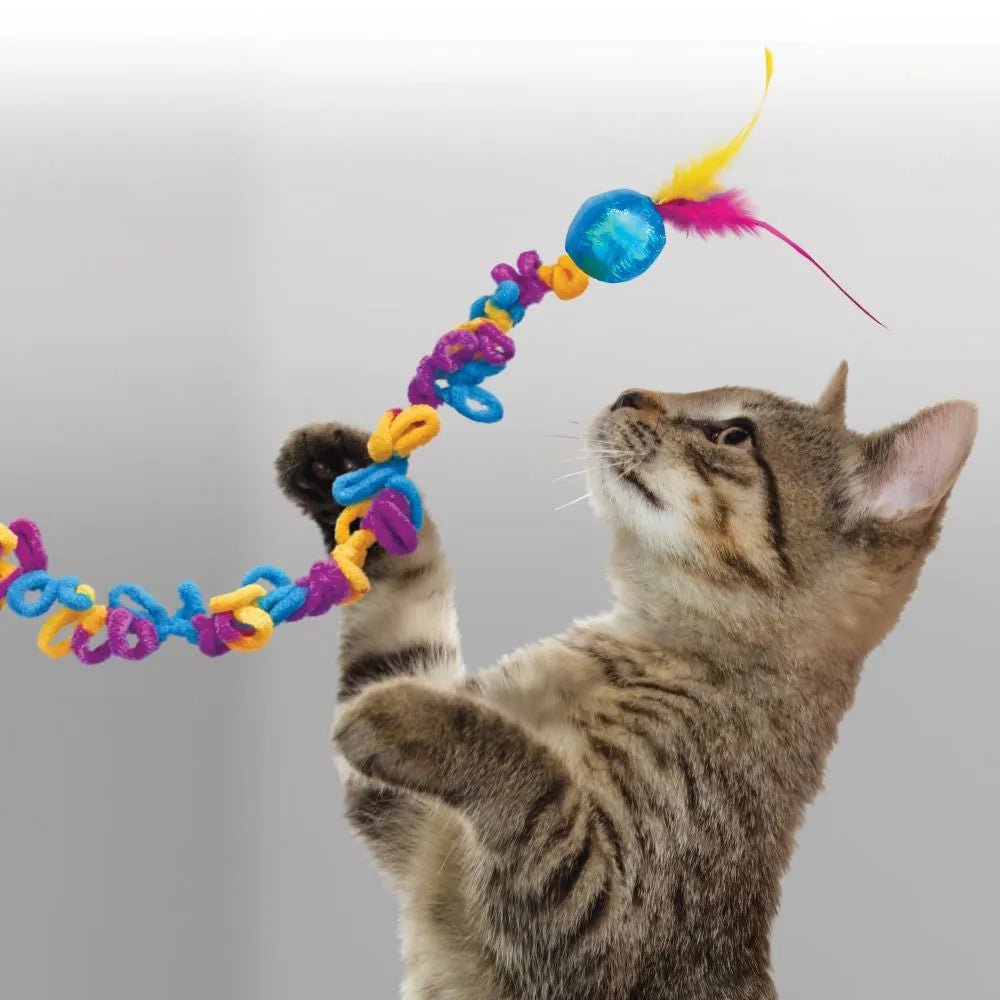Are you one of the lucky ones who will have a four-legged family member? Raising a kitten can be a wonderful experience, but also a test of patience. Many people don't think about the fact that cats have their own way of communicating with us humans, and are confused that a cat's wagging its tail means something completely different than when a dog does the same. In this blog post, you will learn everything you need to know about how to raise a kitten, so that you can communicate better with your kitten - and also have a social and confident cat.
Read all about kittens in our kitten guide !
Cat education - communicate with your cat's language!
While you can consider aspects like the breed and gender of your kitten when choosing one, it can be a little more difficult to predict what your kitten's temperament will be when they grow up. While there are some tricks, such as choosing a cat that comes to you if you want a sociable cat, the way you raise your cat will have a lot to do with how social and trusting your kitten will be when they get older. The first piece of advice we'd like to give you is to learn your cat's language. Pay attention to how their ears are positioned on their head. Is their tail held high or is it wagging from side to side? Once you understand your kitten, you can learn to communicate with them on their own terms, thus achieving a safe and trusting relationship that makes raising your kitten easier.
The cat's natural behavior
Cats have natural behavior patterns that may not be so natural to us. When your kitten climbs the curtains or scratches your new leather sofa, it's not because they find it fun to watch you have to replace all the items financially. Climbing and scratching are important skills for your kitten to learn, as they form the basis for survival in the wild. In addition, the little kitties are also incredibly curious, so be creative and find alternatives that work for both of you. Can't your furball check out the exciting things on the kitchen counter? Put a high chair next to it so it can see what's going on while you're cooking! Give a reward every time it observes you from the chair. Positive reinforcement and patience are key when it comes to how to raise a kitten.
Common mistakes to avoid when raising a kitten
If you want to teach your cat that something is not okay, you need to respond to the behavior immediately. This is so that the kitten connects your reaction to the action it performed. Positive reinforcement should always be used, so if the kitten sharpens its claws on the sofa, you can lift it to the cat furniture immediately and reward it with nice words when it sharpens there instead. You should never use punishment, such as scaring it or using violence when raising a kitten. This will damage your relationship and can lead to a fearful and aggressive cat.
A kitten's first year: an important year for basic upbringing
You shouldn't take a kitten away from its mother and siblings too early. The first 12 weeks are an important socialization phase that benefits new cat owners. Here, the mother cat will teach the little one to clean and eat on her own, while the siblings will teach each other about boundaries, play and socialization. So what do you do when you're taking over the responsibility of raising a kitten from the mother cat? Read more about common challenges when raising a kitten.
Introducing other pets and people
It is said that the first year of a kitten's life lays the foundation for how social a cat will become. Introducing your kitten to children, other cats, or pets is therefore a good idea. If you have socialization as part of your cat's upbringing, you avoid scared and insecure cats when meeting others. Introduce the little one gradually and do this in a safe and stress-free way. This means that you introduce the pet through a window or grille to begin with, for example. Take it easy, and don't let the kitten meet many people at once. Also remember to let it rest between introductions.
Introducing kittens to children
During introductions to other children, you can ask the child to sit still and speak in a low voice, so that the kitten can approach on its own terms. It can be difficult for children to contain their joy when faced with these incredibly cute furballs, but unpredictability is very uncomfortable and one of the main reasons why many cats are skeptical of children. Here it is important to talk to the child about the fact that lively behavior can scare the kitten and encourage gentle handling and play. Remember to keep an eye on what is happening, read the kitten's body language and let them pull away if they show signs that they want to.
Touch and general care
Who doesn't love a cuddly kitten? If you handle your kitten gently and cuddle them from a young age, they will eventually associate people with positive emotions and seek them out. It's important to be careful not to stress your kitten too much and also respect their independence when it sleeps, eats and grooms itself.
For long-haired cat breeds, it may be a good idea to get into the habit of being brushed regularly with a cat brush to prevent matting of the coat. To make general grooming easier, you can make it a habit to check the mouth, ears, and touch the paws. This way, you can avoid a feral cat if you just need to quickly check for ear mites, tartar, or trim the claws.
Potty training for a housebroken kitten
Often the kitten has learned to use the litter box from its mother before moving in. But if it has not been taught this, it is relatively easy, as cats are very clean animals. Show the kitten clearly where the litter box is. If you see that it is about to sit down and go to the toilet, place it in the box with the litter . You can also put it there when it is just awake, has played and eaten a little. If you have a kitten that urinates and defecates in the bed or sofa, as mentioned, scolding it does not help. Often there are underlying reasons for this behavior that may not be directly related to the litter box or the location of the litter box .
Train your kitten to use a scratching post
Sharpening claws is a natural cat behavior, so purchasing a scratching post and scratching furniture is part of the equipment a kitten needs as a new homeowner. Encourage your kitten to use the cat furniture if they start sharpening their claws on sofas. You can also spray lemon scent on the sofa to keep your kitten away, or stick tape with the sticky side out.
Does your kitten bite your hand during play?
When your kitten is little, it's very cute when they nibble and play with your hands, but it may be a good idea to address this behavior early. As their little teeth grow, bite marks will go from being cute to painful, and can also lead to infections. As soon as your kitten wants to play with your hands, switch to a kitten toy instead so the fun can continue.
Clicker training - a fun challenge for your kitten
Clicker training is perhaps most commonly used with dogs, but can work well, especially with food-motivated cats. The same principle of praising good behavior applies here. Give a treat at the same time as you click when the cat displays positive behavior. You can teach your kitten the most incredible tricks with a clicker and a lot of patience. Buy a clicker for this purpose, make a clicking sound with your mouth, or you can simply use a ballpoint pen with a push button for the same effect.
Summary
Raising a kitten can be a test of patience. But if you adapt to your cat's language and natural behavior, you will end up with a social and trusting friend for life. The first year of a kitten's life is an important time to lay the foundation for future behavior. Introduce your kitten to other pets and people gradually and safely. Potty training, scratching posts, cuddles and play are important elements of cat training. If you have a cat that is eager to learn and food-motivated, clicker training will be a fun challenge for both you and the cat. And remember: when raising a kitten, the principle always applies: praise, not punishment.















